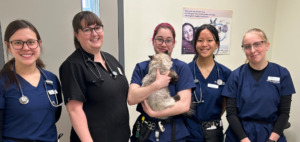Nurturing a passion for pets: Vet Tech Program meets demand
Posted on Tuesday, May 7th, 2024
Simon received a treat while receiving his vaccinations. Mocha was given antibiotics for an infection and Poppy took her first steps and had her incision checked after having her hind leg amputated. Poppy arrived to the SPCA with a previous traumatic injury and came to the Veterinary Learning Center and Clinic unable to use her leg.
her incision checked after having her hind leg amputated. Poppy arrived to the SPCA with a previous traumatic injury and came to the Veterinary Learning Center and Clinic unable to use her leg.
These three animals recently received care from Algonquin College learners as part of the Veterinary Technician diploma and Veterinary Assistant certificate programs. To mark National Pet Week May 5-11 we visit with those learning to care for furry, fluffy and feathered friends.
Located near the soccer bubble in Building V, students are taught in the 10,100 sq. ft. Veterinary Learning Centre and Clinic. The facility includes a multi-use lab and lecture space, reception area, exam rooms, husbandry area, surgical suite, dental suite, radiography room, isolation room, dog run and more. This site is like a real-life small animal clinic, enabling learners to have an on-campus experience using the equipment being used in the field.
Cats and dogs from the SPCA are brought to the clinic where they are assessed and treated for any illnesses. They also receive their vaccinations, receive dental care, are spayed or neutered and receive a microchip. Once animals are healthy and ready to be released, they are returned to the SPCA ready for adoption.
While cats and dogs make up most patients, students study and learn about all animals, including horses and cows and birds in various on campus and off-site labs. They visit local farms including the Canada Agriculture and Food Museum and their working farm to visit chicks, ducks, goats and sheep.
Learners are taught by highly credentialed veterinary professionals on-campus and in partnering facilities in the local community, where they can complete their work placement and often find future employment after graduation.
Patient care includes physical exams, preparing and administering medication, specimen collection and sample analysis, assisting with medical procedures including surgeries and anesthesia, producing diagnostic radiographs and feeding and caring for the animals.
The program is highly respected and accredited by numerous organizations including the College of Veterinarians of Ontario, the Canadian Veterinary Medical Association, the Ontario Association of Veterinary Technicians; certified by the Canadian Council on Animal Care; and registered with the Ontario Ministry of Agriculture, Food and Rural Affairs. Graduates are eligible for consideration for registration by the Ontario Association of Veterinary Technicians and by the Canadian Association for Laboratory Animal Science.
To learn more visit this link.
Watch a video about the program.
- Posted in
- Words
- Tags: